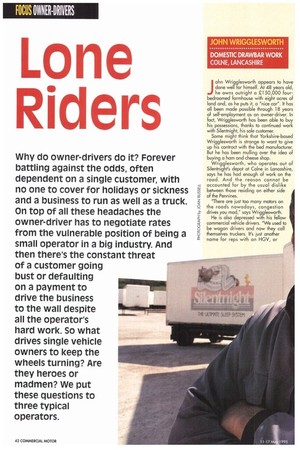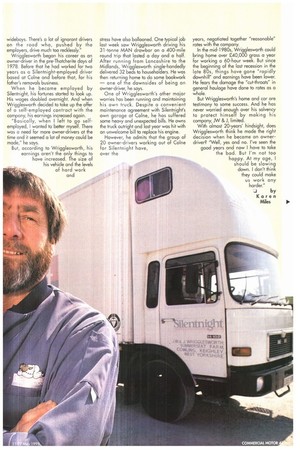Lone Riders
Page 44

Page 45

If you've noticed an error in this article please click here to report it so we can fix it.
Why do owner-drivers do it? Forever battling against the odds, often
dependent on a single customer, with
no one to cover for holidays or sickness and a business to run as well as a truck.
On top of all these headaches the owner-driver has to negotiate rates from the vulnerable position of being a small operator in a big industry. And then there's the constant threat of a customer going bust or defaulting on a payment to drive the business to the wall despite all the operator's hard work. So what drives single vehicle owners to keep the wheels turning? Are they heroes or madmen? We put these questions to three typical operators.
ohn Wrigglesworth appears to have done well for himself. At 48 years old, he owns outright a £150,000 fourbedroomed farmhouse with eight acres of land and, as he puts it, a "nice car". It has all been made possible through 18 years of self-employment as an owner-driver. In fact, Wrigglesworth has been able to buy his possessions, thanks to continued work with Silentnight, his sole customer. Some might think that Yorkshire-based Wrigglesworth is strange to want to give up his contract with the bed manufacturer. But he has been mulling over the idea of buying a ham and cheese shop. Wrigglesworth, who operates out of Silentnight's depot at Colne in Lancashire, says he has had enough of work on the road. And the reason cannot be accounted for by the usual dislike between those residing on either side of the Pennines.
"There are just too many motors on the roads nowadays, congestion drives you mad," says Wrigglesworth.
He is also depressed with his fellow commercial vehicle drivers, "We used to be wagon drivers and now they call themselves truckers. It's just another name for reps with an HGV, or
wideboys. There's a lot of ignorant drivers on the road who, pushed by the employers, drive much too recklessly."
Wrigglesworth began his career as an owner-driver in the pre-Thatcherite days of 1978. Before that he had worked for two years as a Silentnight-employed driver based at Caine and before that, for his father's removals business.
When he became employed by Silentnight, his fortunes started to look up. His wages doubled overnight. And when Wrigglesworth decided to take up the offer of a self-employed contract with the company, his earnings increased again. "Basically, when I left to go selfemployed, wanted to better myself. There was a need for more owner-drivers at the time and it seemed a lot of money could be made," he says. But, according to Wrigglesworth, his earnings aren't the only things to have increased. The size of his vehicle and the levels of hard work and stress have also ballooned. One typical job last week saw Wrigglesworth driving his 31-tonne MAN drawbar on a 400-mile round trip that lasted a day and a half. After running from Lancashire to the Midlands, Wrigglesworth single-handedly delivered 32 beds to householders. He was then returning home to do some bookwork — one of the downsides of being an owner-driver, he says. One of Wrigglesworth's other major worries has been running and maintaining his own truck. Despite a convenient maintenance agreement with Silentnight's own garage at Colne, he has suffered some heavy and unexpected bills. He owns the truck outright and last year was hit with an unwelcome bill to replace his engine. However, he admits that the group of 20 owner-drivers working out of Caine for Silentnight have, over the years, negotiated together "reasonable" rates with the company. In the mid-1980s, Wrigglesworth could bring home over 240,000 gross a year for working a 60-hour week. But since the beginning of the last recession in the late 80s, things have gone "rapidly downhill" and earnings have been lower. He fears the damage the "cut-throats" in general haulage have done to rates as a whole.
But Wrigglesworth's home and car are testimony to some success. And he has never worried enough over his solvency to protect himself by making his company, JW & J, limited.
With almost 20-years' hindsight, does Wrigglesworth think he made the right decision when he became an ownerdriver? 'Well, yes and no. I've seen the good years and now I have to take the bad. But I'm not too happy. At my age, I should be slowing down. I don't think they could make us work any harder." by Karen Miles




































































































